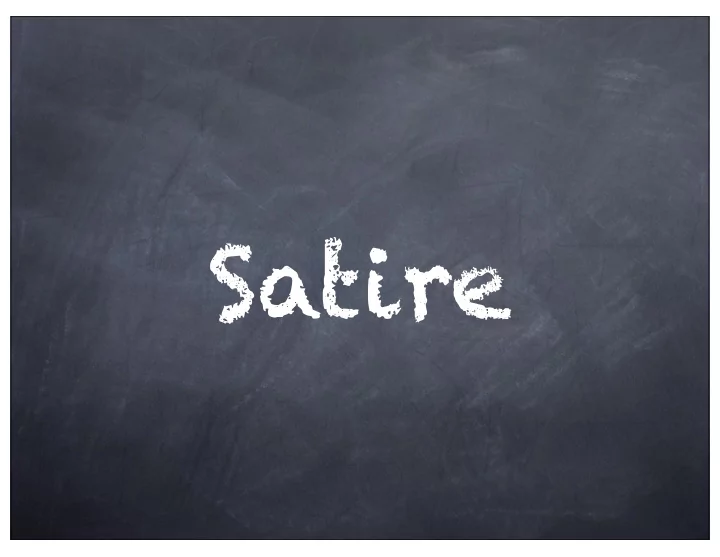

Satire
What is satire? Artistic form in which individual or human vices, abuses, or shortcomings are criticized using certain characteristics or methods Usually found in dramas and literature, but popping up in modern media forms such as cartoons, film, and other visual arts
What is the purpose Encourage the public to view human faults or morally unacceptable behaviors as humorous and ridiculous To encourage changes in current issues or to discourage current public behaviors
Two Types: Horatian and Juvenalian Horatian: - Playfully criticizes vices with wit, exaggeration, gentle and light hearted humor - Issues being criticized are viewed as “folly” rather than evil to society and meant to make us laugh -Looking to make people laugh at themselves, rather than looking for changes to occur
Two Types: Horatian and Juvenalian Juvenalian: - Has a more abrasive tone - Criticizes social “evils” or corruption through scorn, outrage, and savage ridicule - More often pessimistic, using sharp sarcasm to criticize social issues - Generally related to political satires -Focus on morals rather than humor
Techniques/ Characteristics Juxtaposition Irony Parody/Spoofing Analogy Burlesque Oxymoron Sarcasm Exaggeration/Hyperbole Hyperbole Double Entendres/Pun Colloquialism Comparison Antithesis Anticlimax
Verbal Irony When a person says or writes one thing but means another Whatever is said/written is the opposite of the literal meaning Produced intentionally by the person speaking/writing (ex. saying “I’m not upset” in a tone that is obvious to the contrary) Simple Example: Someone saying “Great!”
Situational Irony In literature or drama where persons or events come together in improbable situations, and create “tension” between expected and real results Example: Man and a woman at a bus stop, woman tells man deepest secrets then gets on the bus, man takes of coat and is a priest.
Dramatic Irony The reader/viewer knows something important/secret that the characters don’ t (can be about past, present, or future) Shakespeare is king of this! (Romeo thinks Juliet is dead, but we know better!) Interesting fact: Called the Cassandra Syndrome in films
Analogy Two things that seem different, but can be compared in likeness because they have similar characteristics Can be based on people, situations, or objects Based in a lot of sayings:
Oxymoron Figure of speech that combines contradictory words or phrases something that is surprisingly true Usually and adjective-noun combination Some oxymorons may be incorrect, but established to suggest a joke (Ex. Business Ethics or Military Intelligence)
Sarcasm Sharp, bitter, or cutting expression or remark; a bitter jibe or taunt shown through irony or understatement Witty comments meant to amuse. Possibly used to cause pain or make a point
Hyperbole/Exaggeration And extravagant statement or figure of speech not intended on being taken literally. Meant to encourage strong feelings or impressions to make an effect
Juxtaposition Placement of two things (usually abstract concepts, but sometimes physical objects) near each other Used to compare or contrast two items in one setting or work of literature to add emphasis in one way or another
Parody/Spoofing Something created in order to mock, comment on, or trivialize a certain author, subject matter, style, or some other issue in a humorous manner Is many times used in a playful manner as well, meant to be lighthearted and to poke fun at
Burlesque... no, not the nudie show kind Similar to parody, it is a literary, dramatic, or musical work intended to cause laughter about the original work If the subject contains frivolities, they are treated seriously, and the seriously elements are treated frivolously-everything (generally) is an opposite (ex. dropped ice cream is turned into melodramatic scene) Often includes a character who is in a serious situations acting highly inappropriate
Double Entendres/Pun A figure of speech in which a phrase or set of words is meant to be viewed/understood in two different ways (with the first meaning being obvious, and the second being less so and often risque!) Shakespeare again! Charles Dickens’ character, Charley (Master) Bates (oliver Twist)
Colloquialism Words or phrases used in conventional language This is not slang, which is generally used by only certain groups of people (ex. teens in the 60’ s saying groovy) Generally based on geographical location (ex. soda v pop)
Antithesis An obvious contrast or direct opposite in setting, character, events, symbolism, morals, etc. Can also be seen in parallel language, phrases, word choices, etc. to contrast views
Anticlimax A disappointing resolution to a conflict or plot development Something trivial the concludes a series of important and dramatic events Ex. a villain's dastardly plans are a winding set of complex actions, that can be stopped with the push of a button
Questions?
Recommend
More recommend